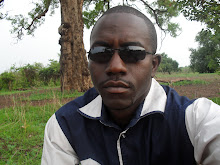
Momodu Mballow" ‘I woke up from bed still unaware that I am in Fulabantang. Usually in those days when I was a small boy, whether you like it or not between 5am to 6am we had to wake up early in the morning otherwise the women will walk in our rooms and use heavy sticks, like the ones they use to grind coos, rice or millet on mortars to wake us. I can distinctly remember one woman who was our neighbor; Nyaadu, not only was she an early riser, but she was one of those women who was skillful in her art. If it was cooking or pounding, I can bet Nyaadu will do in a jiffy.
This time around nowhere around the village did I hear women pounding. One may want to ask this question…isn’t there farmers in the village anymore? I decided to walk into the village and wandered without any particular destination in mind. The village Bantaba (a market place of ideas where men will sit and discuss any issue under the sun) was no longer there, lots of buildings which have been there for many years had all disappeared.
Like The Gambia, Fulabantang was also colonized; it has to change her name from Patcharr Konoba to Fulabantang at the behest of a stranger. Once upon a
time, my late father narrated to me that it was a Whiteman, probably a missionary who coined the name Fulabantang. Hitherto, there was Patcharr Konoba, Patcharr Sanna and Patcharr Yerro, so for the avoidance of doubt or perhaps due to some personal motives, the Whiteman told the natives he wanted change the name of the village. First of all, he looked the area facing YBK, Bansang (which has now become the border between Fulabantang and Sinchu Bora) he saw two trees and was told the name of the trees ‘Fula Bantang’. Henceforth, he announced that he has decided to rename the settlement ‘Fula bantang’ It is interesting to note that those two big trees are still there; the village big tree fondly call Bantangeh died few years after the death of the first alkalo Alhagie Borry Dem.Another issue that strike my attention was hunting bush fowls, we call it ‘felleh gerleh’, when I asked my buddy Abdoulie Wadda, about hunting, his response was clear: ‘that was history’ meaning things have changed. I remember in the 198Os and in the early 1990s, one of my uncles Giddeh Mballow nicknamed Sisawo, the trumpeter used to summon all the youths for hunting.. Another fellow Amadou Ngonnyo Mballow was also very instrumental, especially when it comes to hunting under the scorching sun. With our dogs, we used to comb everywhere in the bush and begin the search with Huuuuummm! Kaakaaah! We do this to let the snakes know that we were not there to frighten them otherwise they may bite us.
At some point, you will hear from the other end, Huuuuuuuuuuu! Aree deh! Meaning Muumuu! It’s coming! But bush fowls are sometimes faster than us; it runs but sometimes flies when it wants to escape deadly attacks. Amadou Ngonyo, Giddeh and few others were the lucky ones when it come chasing bush fowls. Some of us return home without any fowl, by 5pm we’re getting ready to play or watch football at the field where Sisawo who was known for kicking the ball from post to post. And then you have Samba Ceesay Baldeh who on weekly basis made us to buy new footballs because of the way he kicked the balls – no wonder his name was never registered in the Gambia national team. From the football field, some of us would go ahead and start searching for our donkeys to avoid being beaten by our parents who are always eager to see us engage into meaningful activities. In the winter when the atmosphere was cold; we meaning (myself, Abdoulie and Kolley) used to throw water on our legs and hands and pretended that we have taken bath.
At night, especially during the moonlight, we played all sorts of games like ‘Baddeh mbubpeh and hide and seek.
All these things are now history, more than anything else; the youths are now preoccupied with other things, like watching movies, brewing attaya. What do you think is responsible for this sudden change of behavior on the part of the youths, especially as it relate to the Fulabantang case? Watch out for the concluding part of this piece in our subsequent postings.






